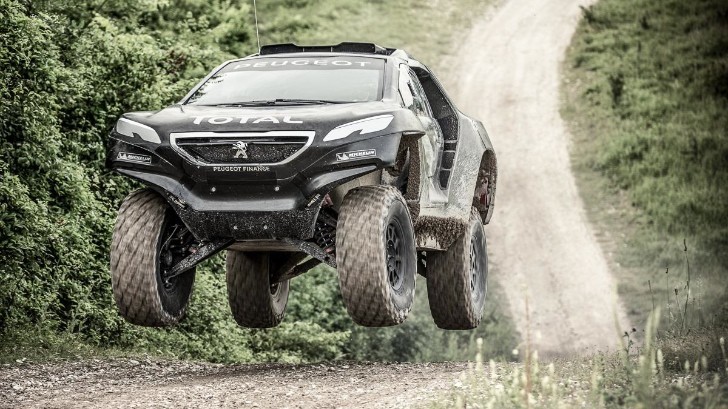If the new 1.6-liter turbo engines in Formula One, Porsche's return to Le Mans and VW's hot action in the WRC aren't reason enough to get back into watching motorsports this year, Peugeot announced details of its all-new 2008 DKR race car for the next Dakar series.
The normal 2008 powering its way on Europe's streets is a very small crossover with 3- and 4-cylinder engines that don't leave a lasting impression. However, the DKR version is a powerful monster with huge suspension arms that can brutishly attack sand dunes using its new V6 twin-turbo diesel engine that generating no less than 340 hp, according to a press statement issued by the company.
“Fitting all of the vital assemblies into such a small space gave us quite a headache!” admits Technical project manager Jean-Christophe Pallier.
The 2008 DKR is also different in terms of power delivery. To put it simply, it's two-wheel drive instead of 4x4. To compensate for this Dakar officials have allowed Peugeot to engineer longer 460mm suspension travel, as opposed to the usual 250mm.
“Small cars tend to perform more comfortably over twisty WRC-type stages, so this arrangement increases the potential of two-wheel drive cars in situations where the 4x4s tend to have the edge,” added Pallier.
More details will come closer to the start of the 2015 race, where Team Peugeot Total will field drivers Carlos Sainz, Cyril Despres and Stéphane Peterhansel.
“Fitting all of the vital assemblies into such a small space gave us quite a headache!” admits Technical project manager Jean-Christophe Pallier.
The 2008 DKR is also different in terms of power delivery. To put it simply, it's two-wheel drive instead of 4x4. To compensate for this Dakar officials have allowed Peugeot to engineer longer 460mm suspension travel, as opposed to the usual 250mm.
“Small cars tend to perform more comfortably over twisty WRC-type stages, so this arrangement increases the potential of two-wheel drive cars in situations where the 4x4s tend to have the edge,” added Pallier.
More details will come closer to the start of the 2015 race, where Team Peugeot Total will field drivers Carlos Sainz, Cyril Despres and Stéphane Peterhansel.












